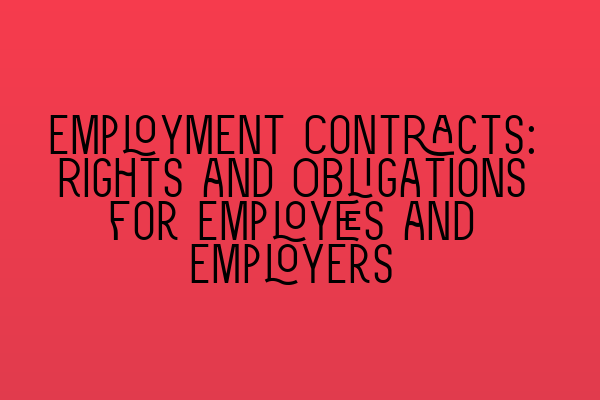Employment Contracts: Rights and Obligations for Employees and Employers
Employment contracts play a vital role in protecting the rights and obligations of both employees and employers. It is essential to understand the key aspects of these contracts to ensure a fair and legally binding agreement. In this article, we will explore the rights and obligations of employees and employers in employment contracts and provide insights into how to navigate this legal landscape.
Understanding Employment Contracts
An employment contract is a legally binding agreement between an employer and an employee, outlining the terms and conditions of their working relationship. It sets out the obligations and rights of both parties and provides a framework for the employment relationship.
It is crucial for both employees and employers to carefully review and understand the terms included in an employment contract. This ensures that both parties have a clear understanding of their rights, responsibilities, and expectations.
As an employee, it is important to familiarize yourself with the key clauses and provisions in your employment contract. This will help you protect your rights, negotiate fair terms, and understand the obligations you owe to your employer.
As an employer, it is essential to draft comprehensive and fair employment contracts that comply with relevant laws and regulations. This will help you establish a strong legal foundation for your working relationships and avoid potential disputes.
Rights and Obligations for Employees
Employees have various rights and obligations outlined in their employment contracts. These rights ensure fair treatment and protection in the workplace.
1. Job Security: An employment contract provides employees with a sense of job security, as it outlines the terms of their employment and duration of their contract. It ensures that employees cannot be terminated without just cause or proper notice.
2. Wage and Benefits: Employment contracts specify the agreed-upon wages, benefits, and other compensation for the employee. It ensures that employees receive fair and timely payment for their work.
3. Working Hours and Conditions: Employment contracts outline the expected working hours and conditions, including breaks, overtime, and leave entitlements. It helps employees maintain a healthy work-life balance and ensures compliance with labor laws.
4. Non-Discrimination and Equal Opportunity: Employment contracts prohibit discrimination and ensure equal opportunity for all employees. It protects individuals from being treated unfairly based on their race, gender, age, or other protected characteristics.
Employees also have obligations towards their employers, which include:
1. Performing Duties: Employees are obligated to perform their duties to the best of their abilities, following the employer’s instructions and adhering to company policies and procedures.
2. Confidentiality: Employment contracts often include confidentiality clauses that require employees to keep sensitive company information confidential, even after their employment ends.
3. Loyalty: Employees have an obligation to act in the best interests of their employer and not engage in activities that could harm the company’s reputation or business interests.
It is important for employees to understand their rights and obligations to ensure a harmonious working relationship with their employer.
Rights and Obligations for Employers
Employers also have rights and obligations outlined in employment contracts. These rights protect their business interests and provide a legal framework for managing their employees.
1. Termination: Employment contracts specify the conditions under which an employer can terminate an employee’s contract, providing protection for businesses in cases of poor performance, misconduct, or redundancy.
2. Confidentiality and Non-Competition: Employers may include confidentiality and non-competition clauses in employment contracts to protect their trade secrets, client lists, and other proprietary information.
3. Intellectual Property: Employment contracts often include provisions that grant employers ownership over any intellectual property created by employees during their employment. This ensures that businesses can protect their inventions, designs, and other valuable assets.
4. Regulatory Compliance: Employers have an obligation to comply with relevant employment laws and regulations, such as minimum wage requirements, health and safety standards, and anti-discrimination laws.
By understanding their rights and obligations, employers can effectively manage their workforce and protect their business interests.
Seeking Legal Advice
Given the complexity of employment contracts and the potential legal implications, it is advisable for both employees and employers to seek legal advice when drafting or reviewing employment contracts.
A knowledgeable solicitor can provide guidance on relevant employment laws, help negotiate fair terms, and ensure that the contract protects the rights and obligations of both parties.
If you have any further questions or need assistance with employment contracts, our team of experienced solicitors at SQE Contract Law will be happy to help. Contact us today for a consultation.
Related Articles:
Exploring the Impact of Frustration on Contractual Obligations: Legal Insights
Interpreting Contractual Clauses: Unlocking the Hidden Meanings
Legal Aspects of Business Contracts: Key Considerations for Entrepreneurs
Agreements in Contract Law: Understanding Its Various Types
Essentials of Consideration: Understanding the Basis of Contractual Exchange
